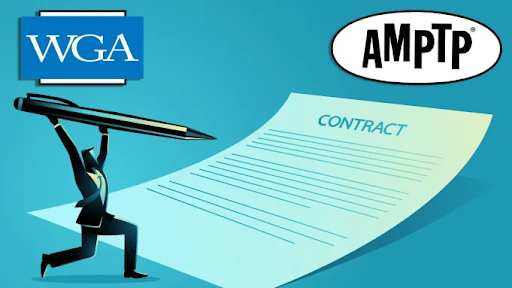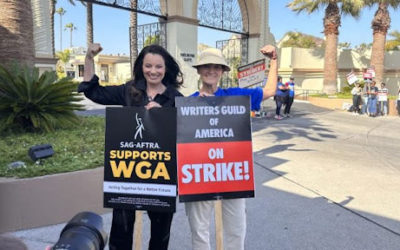Source: Deadline
In a previous article, it was announced that negotiators for both the Writers Guild of America (WGA) and the Alliance of Motion Picture and Television Producers (AMPTP) had agreed to a new contract that would finally bring an end to the former’s strike, which it had held since May of this year. When the announcement was made on September 27th, it looked as if things were finally turning around for the better, and those associated with the guild – specifically the thousands of writers who wrote various different films and television programs for the nation’s major studios – were finally having their demands met. However, at that time, one small but significant obstacle remained before the strike could officially come to an end: once WGA leadership gave their approval to the newly drafted contract, it was up to the remaining voting members to either endorse or reject this new contract. Had it still been too dissatisfying for their liking, and had these voters opted not to agree to these new terms, then the strike would continue forward as it has been for several months now. However, that option appears to be no longer necessary, as those who participated in the ratification vote are almost unanimously in favor of this latest agreement.
During the afternoon of Monday, October 9th, the WGA announced that its membership had finally ratified its long-awaited new contract with the AMPTP, taking roughly a week to vote on the matter and receiving a total of 8,525 votes from the 11,000 members of the WGA West and WGA East divisions. When the time came to determine the response to this new three-year Minimum Basic Agreement, an email was sent throughout the guild to reveal the results of the vote. “There were 8,435 ‘yes’ votes and 90 ‘no’ votes,” the email stated, confirming than an overwhelming majority had voted in approval of the new contract.
Officially going into effect on September 25th and set to expire on May 31st, 2026, this latest contract addresses such ongoing issues as residual payments, data transparency (something that has been highly demanded from streaming services that have abstained from revealing key information regarding how well they’re performing), and stronger protects from AI that might pose a risk to the writers’ employment. For the most part, all of the demands made by the WGA have been agreed to by the AMPTP, meaning that the 148-day strike the former participated in (the second longest in the guild’s history, surpassed only by its 1988 strike) had succeeded in its biggest goals. There were concerns that this might not be the case when the WGA negotiating committee, a group featuring the likes of chief negotiator Ellen Stutzman and former WGA presidents David Goodman and Chris Keyser, sat back down with such studio heads as Warner Bros. Discovery’s David Zaslav and Netflix’s Ted Sarandos on September 20th, but in spite of these worries, it does appear that these studios have finally become willing to agree to the WGA’s terms.
After leaders of both the WGA West Board and the WGA East Council unanimously expressed their support for the new deal on September 26th, the issue was sent to the remainder of WGA members to give their seal of approval (or rejection) to the contract, one that WGAW president Meredith Stiehm and WGAE president Lisa Takeuchi both endorsed with utmost enthusiasm. When the vote revealed that such enthusiasm was shared by the majority of WGA members, Stiehm and Takeuchi were each quick to announce their happiness with the turnout. “Through solidarity and determination, we have ratified a contract with meaningful gains and protections for writers in every sector of our combined membership,” Stiehm claimed in a statement sent to members of the WGA’s western division after the final vote was tallied. “Together we were able to accomplish what many said was impossible only six months ago. We would not have been able to achieve this industry-changing contract without WGA Chief Negotiator Ellen Stutzman, Negotiating Committee co-chairs Chris Keyser and David A. Goodman, the entire WGA Negotiating Committee, strike captains, lot coordinators, and the staff that supported every part of the negotiation and strike.”
Takeuchi, meanwhile, was a little more focused on where to go from here – specifically the support of the Screen Actors Guild – American Television and Radio Artists (SAG-AFTRA) members who are still on strike – in the statement she sent to members of the WGA, though one can still detect a great deal of optimism in her words. “Now it’s time for the AMPTP to put the rest of the town back to work by negotiating a fair contract with our SAG-AFTRA siblings, who have supported writers throughout our negotiations,” Takeuchi remarked. “Until the studios make a deal that addresses the needs of performers, WGA members will be on the picket lines, walking side-by-side with SAG-AFTRA in solidarity.”
Indeed, with SAG-AFTRA still on the picket lines and refusing to let Hollywood continue with business as usual until their demands are met, one shouldn’t automatically assume that things are going to return to normal now that the WGA has received a new contract. At this moment in time, negotiators who represent SAG-AFTRA are expected to meet with the AMPTP at various times throughout the current week. One can only hope that the result of these talks will be a contract just as satisfactory to SAG-AFTRA as the one for the WGA was, but considering that there are some issues that are more exclusive to the plight of the actors (some of which may be harder to fight over with the AMPTP), doing so won’t be easy. In the meantime though, SAG-AFTRA has been overwhelmingly supportive of the WGA, recently congratulating its fellow guild’s success in obtaining a more satisfactory contract. “SAG-AFTRA congratulates the WGA on the overwhelming ratification of their new contract,” the guild announced in its own publicly released statement. “We salute the WGA negotiators, leadership and members for their fortitude and dedication. Onward!”




